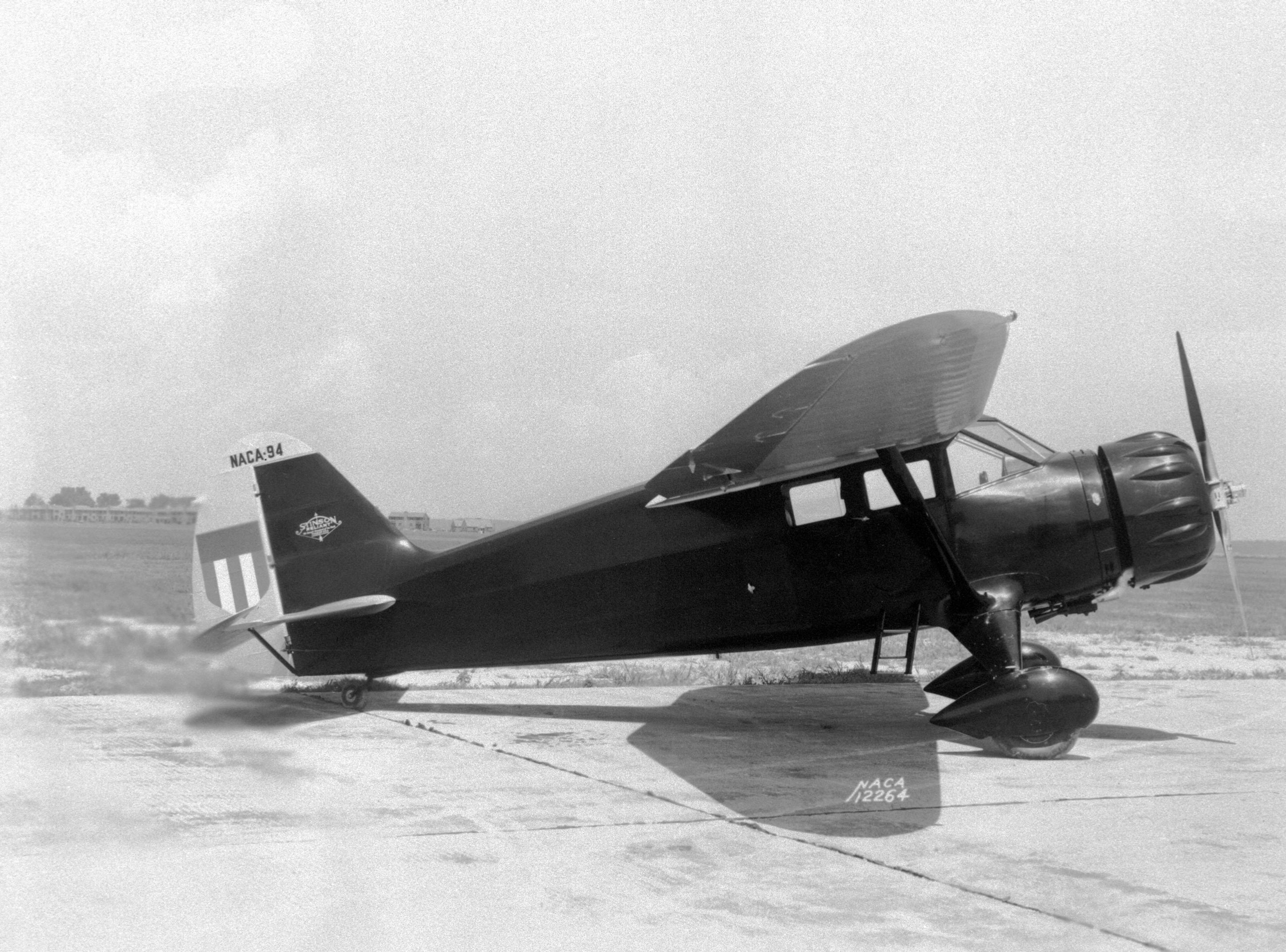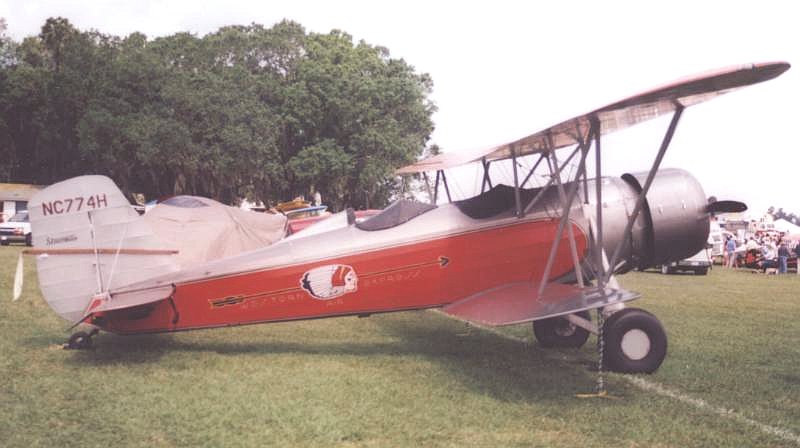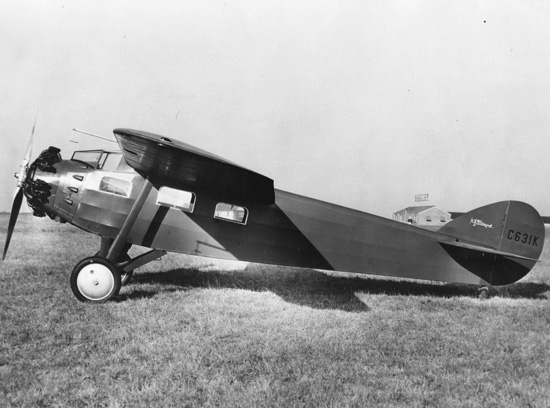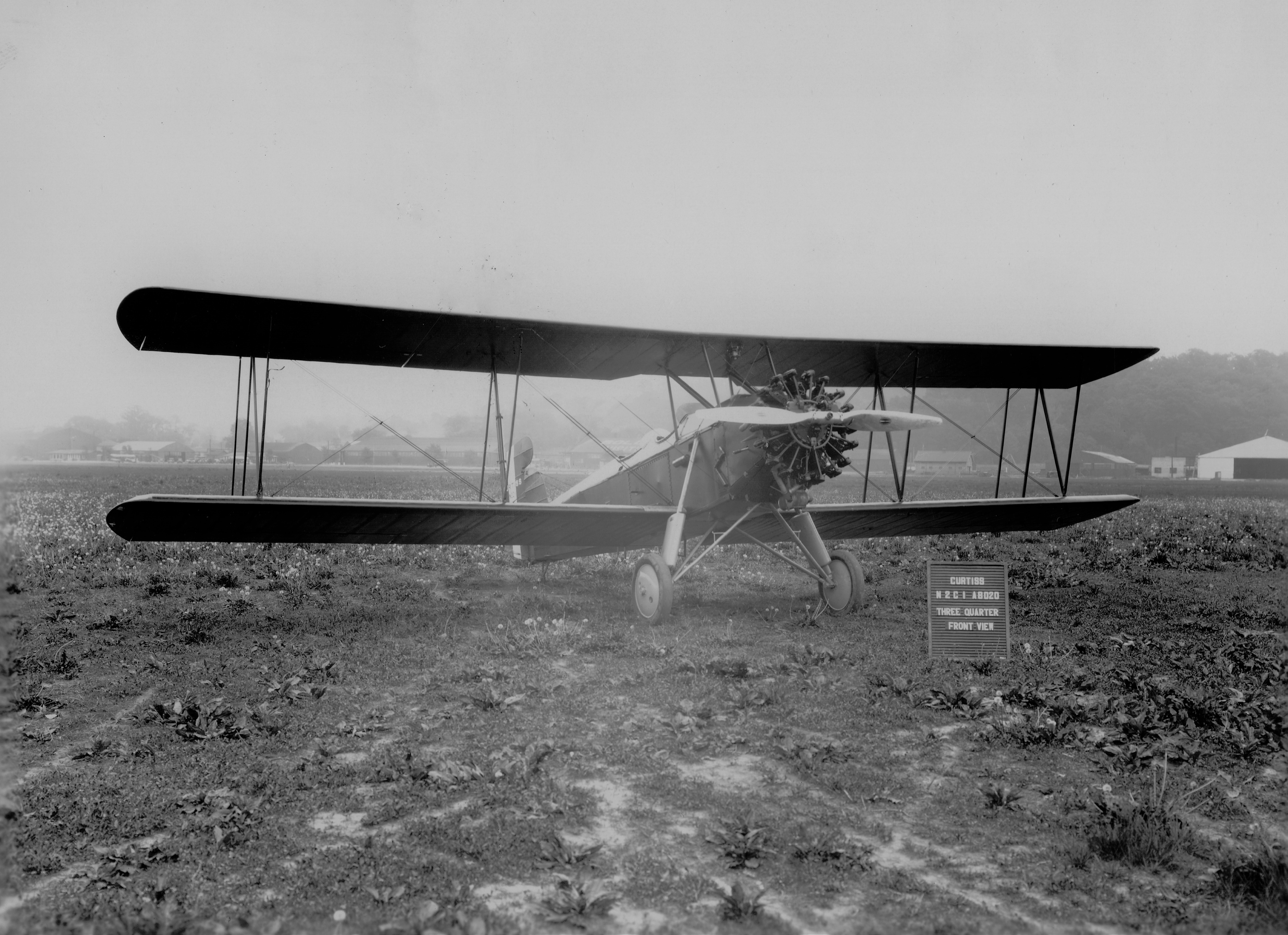|
Wright Whirlwind J6-7
The Wright R-760 Whirlwind was a series of seven-cylinder air-cooled radial aircraft engines built by the Wright Aeronautical division of Curtiss-Wright. These engines had a displacement of 756 in³ (12.4 L) and power ratings of 225-350 hp (168-261 kW). Design and development Wright introduced the J-6 Whirlwind family in 1928 to replace the nine-cylinder R-790 series. The J-6 family included varieties with five, seven, and nine cylinders. The seven-cylinder version was originally known as the J-6 Whirlwind Seven, or J-6-7 for short. The U.S. government designated it as the R-760; Wright later adopted this and dropped the J-6 nomenclature. Like all the members of the J-6 Whirlwind family, the R-760 had larger cylinders than the R-790. The piston stroke of 5.5 in (14.0 cm) was unchanged, but the cylinder bore was expanded to 5.0 in (12.7 cm) from the R-790's bore of 4.5 in (11.4 cm). While the R-790 was naturally aspirated, t ... [...More Info...] [...Related Items...] OR: [Wikipedia] [Google] [Baidu] |
WikiProject Aircraft
A WikiProject, or Wikiproject, is a Wikimedia movement affinity group for contributors with shared goals. WikiProjects are prevalent within the largest wiki, Wikipedia, and exist to varying degrees within sister projects such as Wiktionary, Wikiquote, Wikidata, and Wikisource. They also exist in different languages, and translation of articles is a form of their collaboration. During the COVID-19 pandemic, CBS News noted the role of Wikipedia's WikiProject Medicine in maintaining the accuracy of articles related to the disease. Another WikiProject that has drawn attention is WikiProject Women Scientists, which was profiled by '' Smithsonian'' for its efforts to improve coverage of women scientists which the profile noted had "helped increase the number of female scientists on Wikipedia from around 1,600 to over 5,000". On Wikipedia Some Wikipedia WikiProjects are substantial enough to engage in cooperative activities with outside organizations relevant to the field at issue. For e ... [...More Info...] [...Related Items...] OR: [Wikipedia] [Google] [Baidu] |
Compression Ratio
The compression ratio is the ratio between the volume of the cylinder and combustion chamber in an internal combustion engine at their maximum and minimum values. A fundamental specification for such engines, it is measured two ways: the static compression ratio, calculated based on the relative volumes of the combustion chamber and the cylinder when the piston is at the bottom of its stroke, and the volume of the combustion chamber when the piston is at the top of its stroke. The dynamic compression ratio is a more advanced calculation which also takes into account gasses entering and exiting the cylinder during the compression phase. Effect and typical ratios A high compression ratio is desirable because it allows an engine to extract more mechanical energy from a given mass of air–fuel mixture due to its higher thermal efficiency. This occurs because internal combustion engines are heat engines, and higher compression ratios permit the same combustion temperature to ... [...More Info...] [...Related Items...] OR: [Wikipedia] [Google] [Baidu] |
Brazil
Brazil ( pt, Brasil; ), officially the Federative Republic of Brazil (Portuguese: ), is the largest country in both South America and Latin America. At and with over 217 million people, Brazil is the world's fifth-largest country by area and the seventh most populous. Its capital is Brasília, and its most populous city is São Paulo. The federation is composed of the union of the 26 States of Brazil, states and the Federal District (Brazil), Federal District. It is the largest country to have Portuguese language, Portuguese as an List of territorial entities where Portuguese is an official language, official language and the only one in the Americas; one of the most Multiculturalism, multicultural and ethnically diverse nations, due to over a century of mass Immigration to Brazil, immigration from around the world; and the most populous Catholic Church by country, Roman Catholic-majority country. Bounded by the Atlantic Ocean on the east, Brazil has a Coastline of Brazi ... [...More Info...] [...Related Items...] OR: [Wikipedia] [Google] [Baidu] |
Fábrica Nacional De Motores
Fábrica Nacional de Motores (FNM) was a Brazilian manufacturer of engines and motor vehicles based in the Xerém district of Duque de Caxias near Rio de Janeiro that operated between 1942 and 1988. In 2018, the manufacturer was refounded, changing its name to Fábrica Nacional de Mobilidades (English: "National Factory of Mobilities") based in Rio de Janeiro and producing electric trucks at the Agrale factory in Rio Grande do Sul. Origins The company was created 1942 by the Brazilian state as part of the Estado Novo agenda of President Getúlio Vargas. It was one of several business launched by the state during this period (including also Companhia Siderúrgica Nacional launched in 1941 and CHESF in the later 1940s) to kick start an industrial sector in Brazil. Initially the company produced American Curtiss-Wright aircraft engines under license along with ammunition, bicycles, spindles and refrigerators. After the Second World War it decided to diversify its production. The g ... [...More Info...] [...Related Items...] OR: [Wikipedia] [Google] [Baidu] |
Waco Aircraft Company
The Waco Aircraft Company (WACO) was an aircraft manufacturer located in Troy, Ohio, United States. Between 1920 and 1947, the company produced a wide range of civilian biplanes. The company initially started under the name Weaver Aircraft Company of Ohio but changed its name to the Waco Aircraft Company in 1928/29. Company name WACO (referring to the aircraft) is usually pronounced "wah-co" (the first syllable pronounced as in "water"), not "way-co" like Waco, Texas, whose name is entirely unrelated. Several companies operated under the Waco name, with the first company being the Weaver Aircraft Company, a firm founded by George E. Weaver, Clayton Bruckner, and Elwood Junkin in 1920 in Lorain and Medina, Ohio after they had already been collaborating for several years. In the spring of 1923 this became the Advance Aircraft Company in Troy, Ohio, after the departure of Weaver. In 1929, it was changed from Advance Aircraft Company to Waco Aircraft Company. The firm is often ... [...More Info...] [...Related Items...] OR: [Wikipedia] [Google] [Baidu] |
Stinson Aircraft Company
The Stinson Aircraft Company was an aircraft manufacturing company in the United States between the 1920s and the 1950s. History The Stinson Aircraft Company was founded in Dayton, Ohio, in 1920 by aviator Edward “Eddie” Stinson, the brother of aviator Katherine Stinson. After five years of business ventures, Eddie made Detroit, Michigan the focus of his future flying endeavors while still flying as a stunt pilot, earning $100,000 a year for his efforts — a huge sum in those days. Stinson found Detroit's business community receptive to his plans to develop his own airplane. Alfred V. Verville and a group of local businessmen — the Detroit Board of Commerce's Aviation Committee — supported Stinson's plans to establish the Stinson Aircraft Syndicate in 1925 and provided $25,000 to design and build a prototype, an enclosed cockpit, 4-place biplane, powered by a Wright Whirlwind J-4 air-cooled radial engine test flighted at Packard Field in Roseville, Michigan, a nort ... [...More Info...] [...Related Items...] OR: [Wikipedia] [Google] [Baidu] |
Stearman Aircraft
Stearman Aircraft Corporation was an Aerospace manufacturer, aircraft manufacturer in Wichita, Kansas. Although the company designed a range of other aircraft, it is most known for producing the Boeing-Stearman Model 75, Model 75, which is commonly known simply as the "Stearman" or "Boeing Stearman". History Lloyd Stearman established the Stearman Aircraft Corporation in 1927 in aviation, 1927. Initially, the company was founded as Stearman Aircraft Corporation in October 1926 at Venice, California, where four C1 and C2 biplanes were built before production halted for financial reasons. On 27 September 1927, a new Stearman Aircraft Corporation was founded. The factory was then established in Wichita, Kansas, with financing of Walter Innes, where the new model Stearman C3 and Stearman 4 Speedmail were constructed. Two years later, he sold it to the United Aircraft and Transport Corporation. The Northrop Aircraft Corporation was merged into Stearman in July 1931. In September 1 ... [...More Info...] [...Related Items...] OR: [Wikipedia] [Google] [Baidu] |
Howard DGA-8
The Howard DGA-8, DGA-9, DGA-11, and DGA-12 were a family of four-place, single-engine, high-wing light monoplanes built by the Howard Aircraft Corporation, Chicago, Illinois from 1936. Development The various models were distinguished by different engine choices and detail changes, and were built and sold in parallel to each other. A number of examples were built as one type and converted to another during their lifetimes. The DGA-11, powered by a nine-cylinder Pratt & Whitney Wasp Junior radial engine, was purportedly the fastest four-seat civil aircraft of the late 1930s, able to achieve a top speed of about . A favorite of the high society and Hollywood circles, the DGA-11 cost about $16,500 in 1938. These aircraft were a direct developments of the famous Howard racing plane ''Mister Mulligan''. Designer/pilot Ben Howard's "DGA" prefix stood for "Damned Good Airplane". History The DGA-6's racing success brought the DGA series much attention, and in its various permutations, ... [...More Info...] [...Related Items...] OR: [Wikipedia] [Google] [Baidu] |
Cessna
Cessna () is an American brand of general aviation aircraft owned by Textron Aviation since 2014, headquartered in Wichita, Kansas. Originally, it was a brand of the Cessna Aircraft Company, an American general aviation aircraft manufacturing corporation also headquartered in Wichita. The company produced small, piston-powered aircraft, as well as business jets. For much of the mid-to-late 20th century, Cessna was one of the highest-volume and most diverse producers of general aviation aircraft in the world. It was founded in 1927 by Clyde Cessna and Victor Roos and was purchased by General Dynamics in 1985, then by Textron, Inc. in 1992. In March 2014, when Textron purchased the Beechcraft and Hawker Aircraft corporations, Cessna ceased operations as a subsidiary company and joined the others as one of the three distinct brands produced by Textron Aviation. Throughout its history, and especially in the years following World War II, Cessna became best-known for producing hig ... [...More Info...] [...Related Items...] OR: [Wikipedia] [Google] [Baidu] |
Beechcraft
Beechcraft is an American brand of civil aviation and military aircraft owned by Textron Aviation since 2014, headquartered in Wichita, Kansas. Originally, it was a brand of Beech Aircraft Corporation, an American manufacturer of general aviation, commercial, and military aircraft, ranging from light single-engined aircraft to twin-engined turboprop transports, business jets, and military trainers. Phillips, Edward H., aviation historian, BOOK:"Beechcraft: Pursuit of Perfection: A History of Beechcraft Airplanes,"1992, Flying Books, , 9780911139112, retrieved May 16, 2017Green, William, Gordon Swainborough, and John Mowinski, BOOK"Modern Commercial Aircraft,"1987, Portland House, New York, Beech later became a division of Raytheon and then Hawker Beechcraft before a bankruptcy sale turned its assets over to Textron (parent company of Beech's historical cross-town Wichita rival, Cessna Aircraft Company). It remains a brand of Textron Aviation.Ostrower, Jon and John Kell"Textron ... [...More Info...] [...Related Items...] OR: [Wikipedia] [Google] [Baidu] |
Utility Aircraft
A utility aircraft is a general-purpose light aircraft, light airplane or helicopter, usually used for transporting people, freight or other supplies, but is also used for other duties when more specialized aircraft are not required or available. The term can also refer to an aircraft type certificated under American, Canadian, European or Australian regulations as a ''Utility Category Aircraft'', which indicates that it is permitted to conduct limited aerobatics. The approved maneuvers include chandelles, Aerobatic maneuver, lazy eights, Spin (aerodynamics), spins and Steep turn (aviation), steep turns over 60° of bank.Crane, Dale: ''Dictionary of Aeronautical Terms, third edition'', page 535. Aviation Supplies & Academics, 1997. In the United States, military utility aircraft are given the prefix U in their United States Department of Defense aerospace vehicle designation, designations. See also * Federal Aviation Regulations#Part 23, FAR Part 23 (refers to "utility category ... [...More Info...] [...Related Items...] OR: [Wikipedia] [Google] [Baidu] |
Curtiss Fledgling
The Curtiss Fledgling, known internally to Curtiss as the Model 48 and Model 51 was a trainer aircraft developed for the United States Navy in the late 1920s and known in that service as the N2C. Design and development The Fledgling was designed in response to a 1927 Navy requirement for a new primary trainer, and was selected after evaluation in competition with fourteen other submissions. The Fledgling was a conventional biplane design with two-bay, staggered wings of equal span braced with N-struts. The pilot and instructor sat in tandem, open cockpits, and the fixed tailskid undercarriage could be easily swapped for a large central pontoon and outrigger floats under the wings for seaplane training. The Navy ordered two batches of the Fledgling, each powered by different versions of the Wright Whirlwind engine, both of which were built under the Curtiss designation Model 48. Believing the design to have commercial potential, Curtiss developed the Model 51 as a civil equivalen ... [...More Info...] [...Related Items...] OR: [Wikipedia] [Google] [Baidu] |






.jpg)
